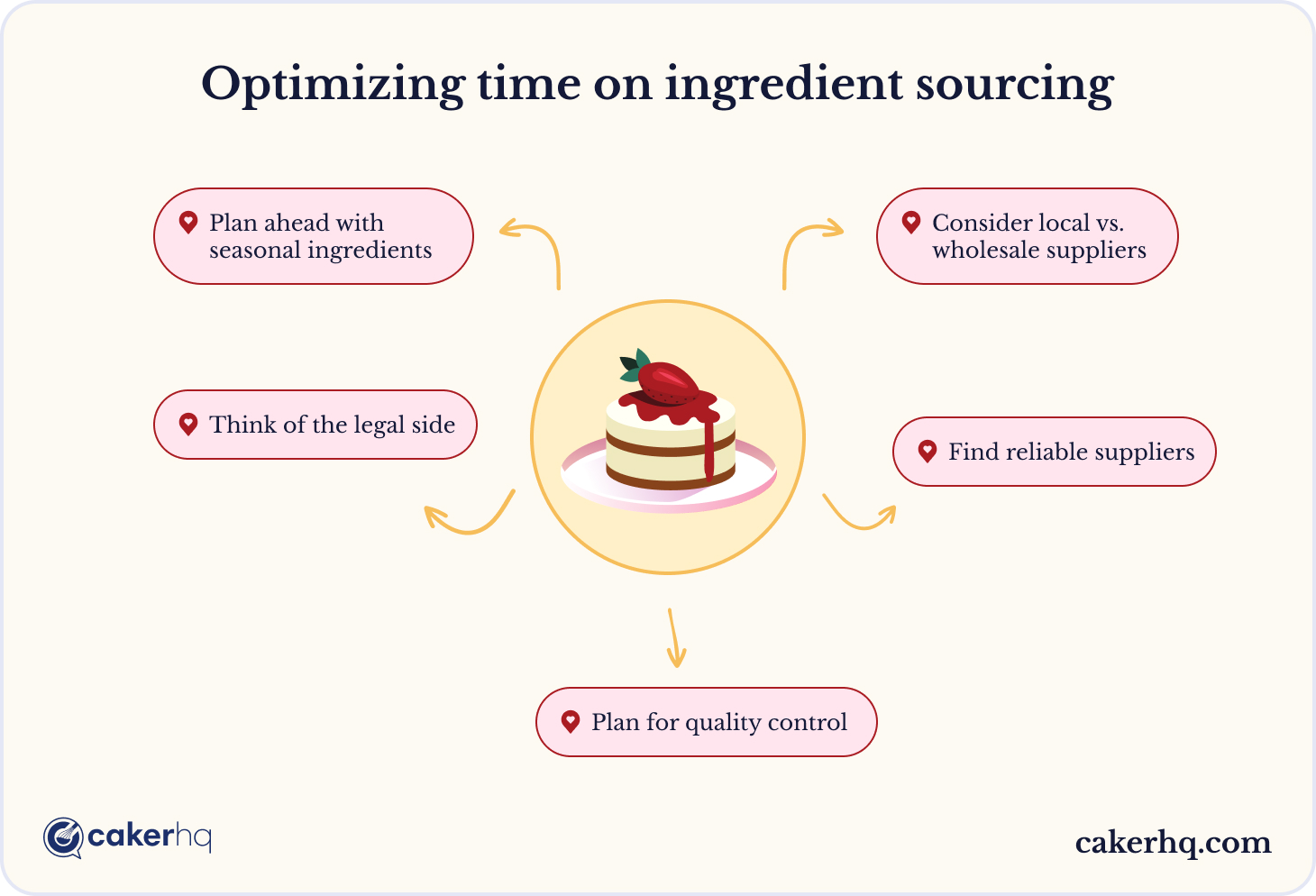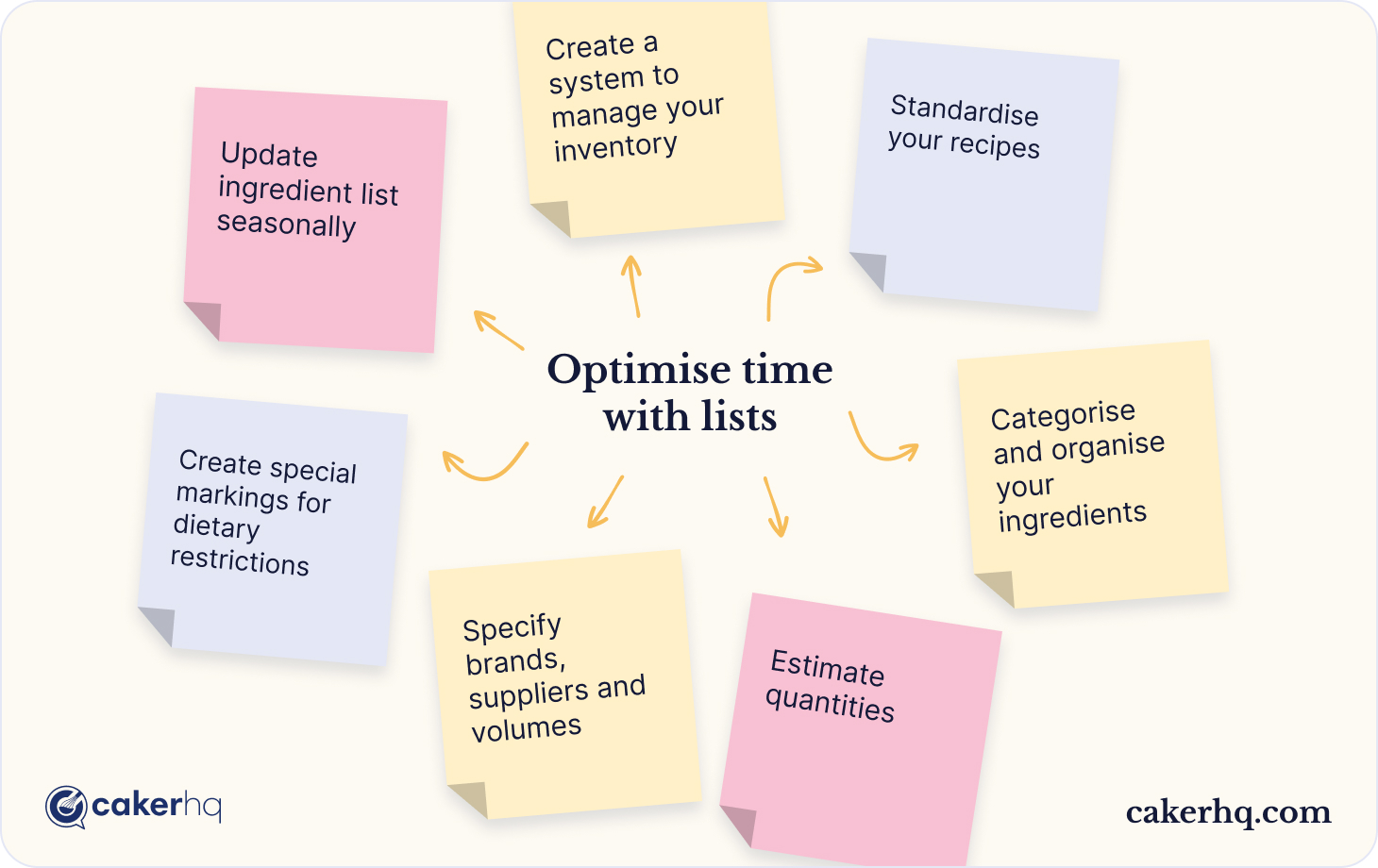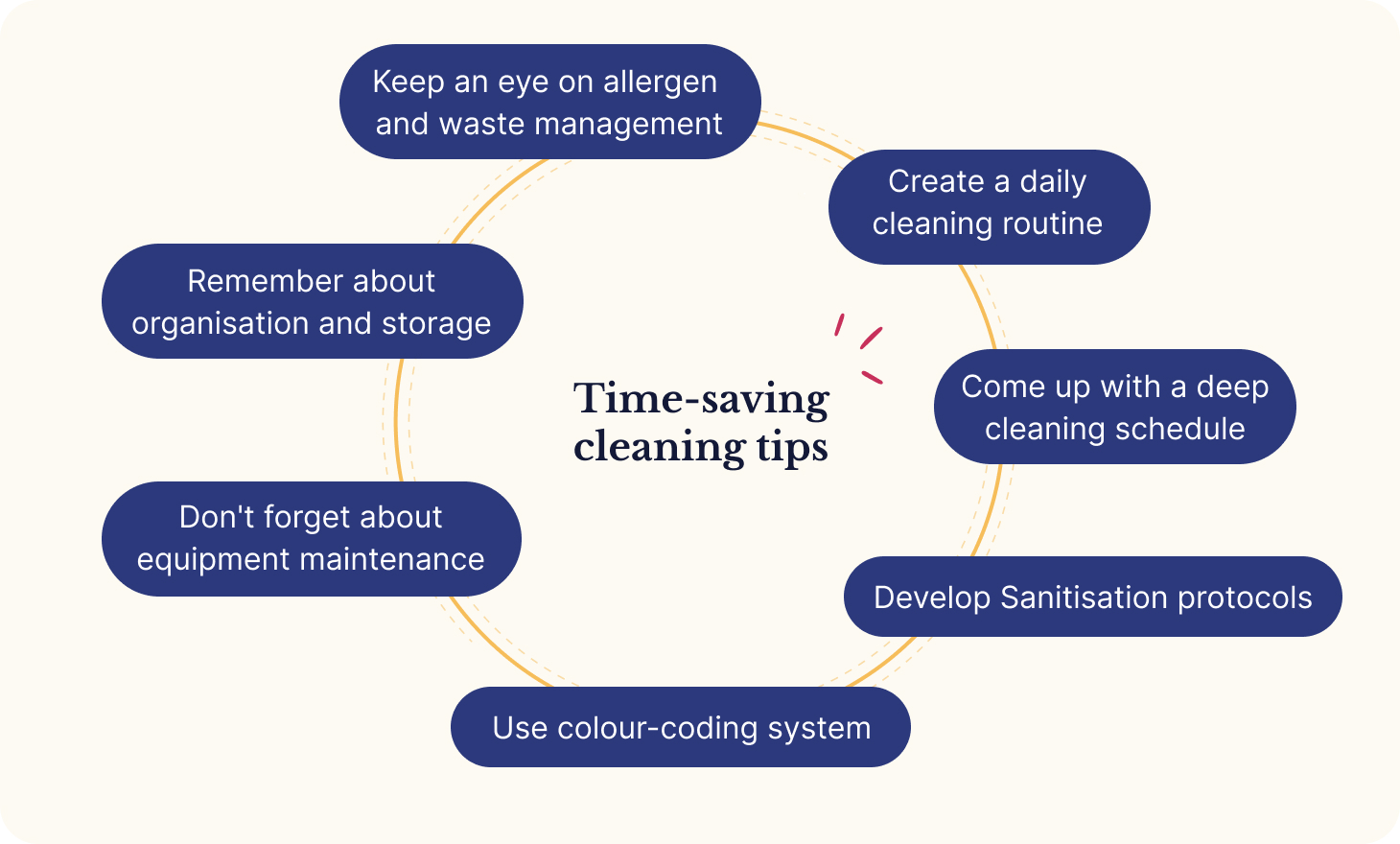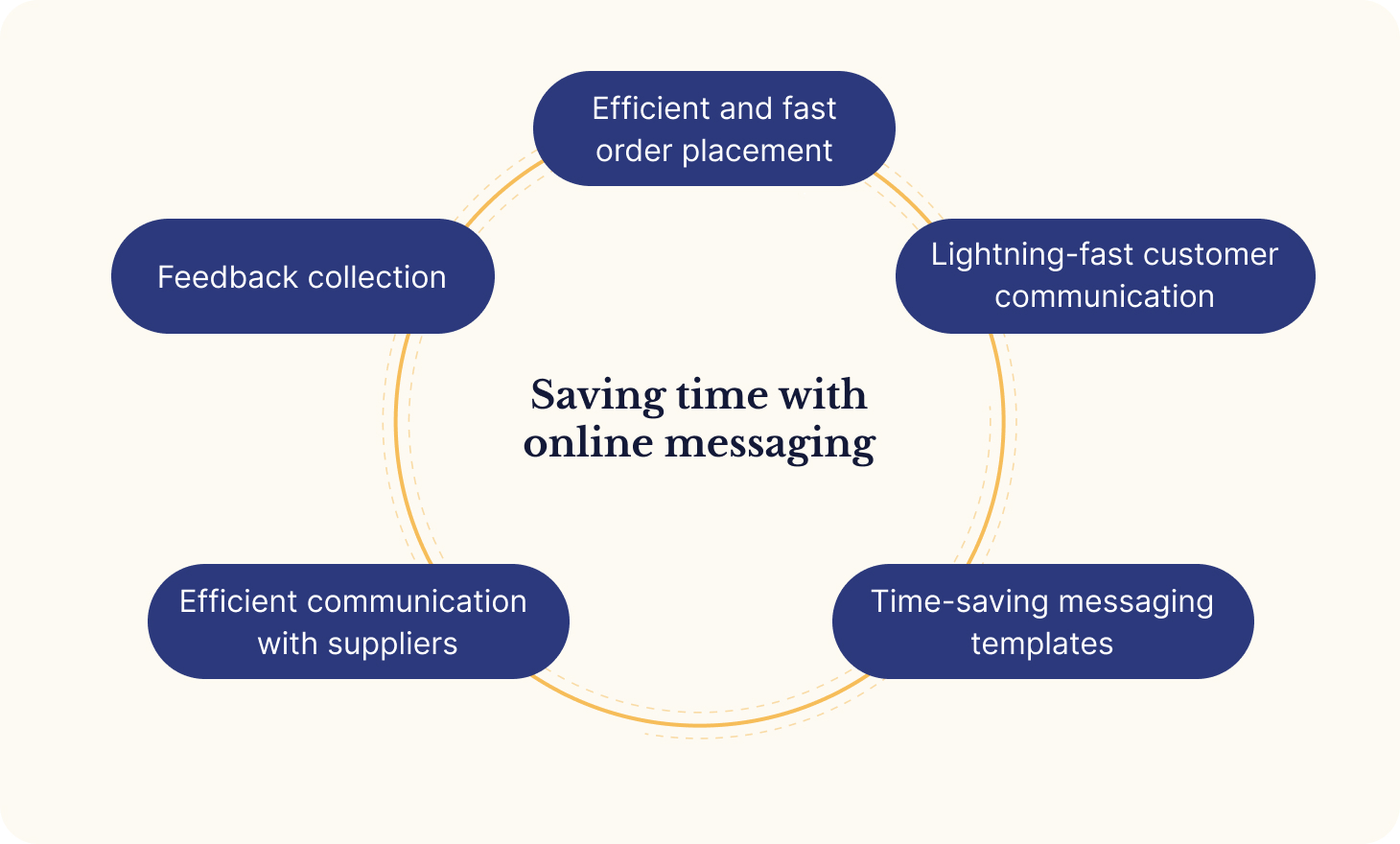In the cake-making business, time is essential. Mastering it is as important as any skill you need to get the job done. Furthermore, it gets even more important when your business thrives with orders and customers awaiting their beloved cakes.
Thus, in this piece, we will outline some essential tips for you to master baking time management. Although some of them may feel obvious, it is still important to have a cheat sheet list of tips for effective time management so you can always refer to them when looking for ways to improve your services. Without further ado, let’s move on.
Sourcing ingredients
Needless to say, they’re a backbone of your bakes. The quality and availability of ingredients can greatly influence the outcome of your baked goods and ultimately impact customer satisfaction. Here's an extended look at everything you should account for in this regard.
Local vs. wholesale suppliers. Consider two options, each with its ups and downs. For instance, local suppliers may offer fresher produce and specialty items, while wholesalers often provide bulk discounts and a wider selection.
Seasonal ingredients. Such ingredients can bring a lot of freshness to your bakes. This way, you can support local farmers, promote sustainability, and ensure the freshest and most flavourful ingredients for your products.
Supplier relationships. Finding reliable partners always means reliability and consistency. When looking for them, communicate your needs clearly, negotiate pricing, and inquire about exclusive deals or special offerings.
Quality control. Regardless of the source of your ingredients, establish strict quality control measures to guarantee freshness and safety. Never neglect to inspect deliveries upon arrival, check for expiration dates, and store ingredients properly to maintain their integrity.
The legal side of things. Always choose suppliers that adhere to industry standards and certifications, such as organic, non-GMO, or fair trade certifications. This not only aligns with consumer preferences for ethically sourced ingredients but also enhances the reputation of your bakery.
Emphasising sourcing high-quality ingredients and implementing effective strategies for procurement and management, your bakery can ensure consistency, reliability, and excellence in every batch of baked goods.
Making a list
Another old but gold method to improve your cake baking time management is making a list. Before any baking, creating a comprehensive ingredient list is not only a good habit but also a great time saver. Here are a few tips on how to make the most out of it.
Standardise. With properly standardised recipes, you get a consistent baseline for ingredient quantities and proportions. This allows you to create standardised ingredient lists for each recipe, reducing variability and minimising errors in ingredient ordering.
Categorise and organise. Sorting all needed ingredients into categories is also a good habit. For instance, you can create categories such as dry goods, refrigerated items, produce, and spices. This way, you’ll facilitate efficient shopping and inventory management. Within each category, further subdivide ingredients based on frequency of use or storage requirements.
Estimate quantities. Estimate ingredient quantities based on your bakery's production needs. To make it efficient, consider anticipated sales volume, menu offerings, and seasonal variations in demand. Additionally, factor in buffer quantities to account for unexpected fluctuations or surges in orders.
Specify. Throughout your experience, you are probably used to certain brands or suppliers. Thus, when making lists, include supplier specifications or preferences for each ingredient on your list. Apart from favourite brand, consider including package sizes or ordering deadlines.
Be mindful. In your lists, create special markings for allergens and dietary restrictions associated with each ingredient. This way, you will save tons of time when it comes to creating gluten-free, vegan, or nut-free cakes.
Consider seasonality. Update your ingredient list seasonally or create separate lists for such items. Seasonal fruits or other items may fluctuate in availability, pricing, and quality during different time periods. This way, you will eliminate risks associated with their availability.
Manage inventory. In addition to lists, consider creating a system that will save tons of time once you make it properly. In this matter, you can use different software. Perhaps one of the most common examples would be using Google products, such as Docs and Sheets. The latter can help with storing recipes, while Sheets offer tables useful for managing quantities, prices, and more.
Surely, establishing detailed lists and a system afterwards is a time-consuming task. They require a lot of dedication and planning, especially if you’re not used to it. However, if done properly, you will be surprised how helpful they can be when it comes to organising and saving your precious time.
Pre-payment importance
Financial operations are another important aspect of efficient time management. No wonder the majority of businesses implement or adhere to this model. Simply put, it offers several substantial benefits and works between the customer and the cake maker and between the supplier and the cake maker.
Transparency with suppliers. Pre-payment promotes transparency between your bakery and its suppliers. Clear terms and agreements regarding pre-payment arrangements build confidence and minimise misunderstandings or disputes, leading to smoother transactions and stronger partnerships.
Trust with customers. With pre-payment in place, customers essentially sign up for your cake, providing certainty they’re awaiting it and willing to pay. This way, pre-payments provide security and trust between you and your customers.
Risk mitigation. Pre-payment can mitigate risks associated with price fluctuations, currency exchange rates, or supplier instability. If you lock your prices in prices and secure inventory in advance, you can shield your bakery from market volatility and uncertainties.
Financial planning. With prepayments, you can get a better picture of your finances and cash flow. Thus, it will make planning easier and help avoid cash crunches during peak production periods or unforeseen expenses.
Discounts and incentives. To stimulate users to adhere to your pre-payment system, you can offer substantial benefits, such as volume discounts, early payment discounts, or waived delivery fees.
Supply chain resilience. When it comes to ordering ingredients, pre-payment can contribute to a more resilient supply chain. When you provide suppliers with an upfront payment to invest in inventory, production capacity, or infrastructure improvements, you get more guarantee that your order will arrive in time and not be damaged. This, in turn, reduces the risk of supply disruptions or delays due to supplier financial constraints.
Securing ingredient availability. The market is volatile, especially when you order seasonal fruits or other specific ingredients. Pre-payment, in turn, can secure access to essential ingredients that may be in short supply or subject to allocation. With this proactive approach, you can prevent stockouts or production delays.
Need to save time searching for buyers? Entrust it CakerHQ! Sign up today
Cleaning tips
Maintaining a clean and hygienic workspace is essential. This is not only to ensure food safety, product quality, and compliance with health regulations but also to save time, and lots of it. Traditionally, here are a few tips you may already know, but still, they are worth outlining:
Daily cleaning routine. First off, it should be regular, covering all areas of the bakery. For intance, pay special attention to workstations, equipment, floors, and storage areas. In case you have staff members, assign specific tasks to each member and establish clear responsibilities to ensure thoroughness and consistency.
Deep cleaning schedule. Certain tasks require more time and effort, such as descaling ovens, degreasing ventilation systems, and cleaning hard-to-reach areas. Schedule these tasks during off-peak hours to minimise disruption to bakery operations.
Sanitisation protocols. Although it may sound exaggerated, sanitisation is a real thing. These protocols can help prevent the spread of contaminants and pathogens. When cleaning, make sure you use approved cleaning agents, sanitisers, and disinfectants to effectively eliminate bacteria, viruses, and other harmful microorganisms from surfaces and equipment.
Colour-coding system. You can mark cleaning tools and equipment with unique colours to prevent cross-contamination between different areas or types of ingredients. Additionally, assign specific colours to cleaning cloths, brushes, and utensils for use in designated zones, such as raw and cooked food areas.
Equipment maintenance. Prioritise regular maintenance and cleaning of bakery equipment to prolong lifespan, optimise performance, and prevent breakdowns or malfunctions. Follow manufacturer guidelines for cleaning procedures and don't be afraid to use professional servicing as needed.
Organisation and storage. Maintain a well-organised and clutter-free storage area for ingredients, packaging materials, and cleaning supplies. Use shelving, racks, and containers to keep items off the floor and easily accessible, reducing the risk of spills, contamination, and pest infestations.
Allergen management. Implement strict procedures for managing allergens, including segregation of ingredients, dedicated equipment for allergen-free products, and thorough cleaning of shared equipment between batches. Labelling and signage can help prevent accidental exposure to allergens.
Waste management. Establish effective waste management protocols for handling and disposing of food waste, packaging materials, and cleaning supplies. Separate recyclable materials from non-recyclables and ensure proper disposal of hazardous substances in accordance with local regulations.
Time management tips
Efficient time management is crucial to meet order deadlines, minimise waste, and ensure timely delivery of fresh baked goods. Here are some practices you can adopt.
- Batch production. Organise production tasks into batches to streamline workflows and maximise efficiency. Once you start receiving a lot of orders, group similar items or recipes together to minimise setup and transition times between tasks.
- Production scheduling. It’s OK if you just know how to make everything. However, developing a strategy is much better and can save a lot of time. With a production schedule, you can outline the sequence of tasks, production times for each item, and allocation of resources such as ingredients and equipment. Factor in lead times for proofing, baking, cooling, and packaging to optimise throughput and minimise idle time.
- Prioritise tasks. Absolutely necessary! Identify and prioritise critical tasks based on deadlines, customer orders, and production volumes. Then, allocate resources accordingly.
- Utilise the Getting Things Done methodology. With GTD, capture all tasks and ideas into a trusted system, clarifying what each task entails and defining actionable steps. Then, organise them based on context, priority, and time available.
- Use what the Internet offers. First off, certain tools can simplify communication within your team if you have one. Use tables to optimise the bakery management and think about using digital scheduling tools to simplify operations.
Online messaging
In bakery operations, efficient communication with customers, suppliers, and staff members is a great time saver. Here’s how you can improve your bakery processes with effective messaging.
- Order placement. With online messaging, you can let your customers place orders fast and easily. Offer multiple channels for order placement, such as your professional profile on CakerHQ, social media messaging, or even website forms if you have your own website.
- Customer communication. Using calls or emails is not as efficient as it takes time and may not be comfortable enough. With social media, you can invest much less time in providing personalised service, addressing inquiries, and resolving issues promptly.
- Create templates. To save even more time on messaging, use templates instead of writing each message on your own every single time. Create templates for greetings and goodbyes, order confirmations, and order details.
- Supplier communication. With ingredient suppliers and vendors, messaging should also be strict and easy. Thus, you can prepare order lists in advance, use templates for placing orders, and coordinate logistics.
- Feedback collection. With social media, you can effectively gather feedback and testimonials from customers regarding their bakery experience. Encourage customers to share their thoughts, suggestions, and reviews. Do not forget to study through feedback to see what you can improve in your services.
Early ordering
In other words, it is a strategic practice. You can optimise many processes when you encourage customers to place orders well before their desired pickup or delivery date. However, you should clearly communicate this point so that people understand it takes time and effort to make their order.
First of all, here’s how you can encourage people to respect your ordering process:
- Mention it everywhere. In social media, along with the description of your services, mention the preferable order time. Make it stand out so that people won’t miss it. Additionally, mention it in your greeting template when messaging or wherever you think it is suitable.
- Thank customers for understanding. After any clear and understandable order, do not forget to mention and thank your customers for respecting your deadlines and preferred order times. This way, you can ensure they remember the rules, and their future orders will be as respectable.
- Offer something in exchange. It can be difficult for some people to forecast their order far ahead. Plans always change, you know that. So, to encourage customers to place early orders, offer them something. For instance, you can offer a partial refund if they cancel the order. Alternatively, offer them a slight discount if they place an order far ahead.
There are plenty of benefits well-established early ordering culture can bring to your cake-making venture. Among all, there are:
- Streamlined production, of course. Early ordering allows you to plan and organise production schedules more effectively.
- Enhanced inventory management. Considering that you will know the quantity and variety of products needed in advance, you can manage ingredient inventory more efficiently.
- Customisation/personalisation. Early ordering allows customers to request customised or personalised baked goods tailored to their preferences. These can be intricate flavour combinations, dietary requirements, or decorative themes.
- Promotional opportunities. You can leverage early ordering as an opportunity to promote seasonal specials, limited-time offers, or bundled deals. By incentivising customers to place orders in advance through discounts or exclusive promotions, you can drive sales and generate excitement around your baked goods.
Bottom line
In summary, it’s difficult to highlight something specific. In this article, we’ve gathered bakery hacks suitable for many scenarios, from one-man-army bakeries to big cake-oriented cafes. Regardless of your experience, we sincerely hope some of the tips for baking can greatly optimise your cake-making venture’s performance and save time.
Cake making world is multi-faceted, and there are a lot of things to keep track of. Thus, feel free to refer to our blog, where we highlight cake baking hacks, guides, seasonal ideas, and much more.




